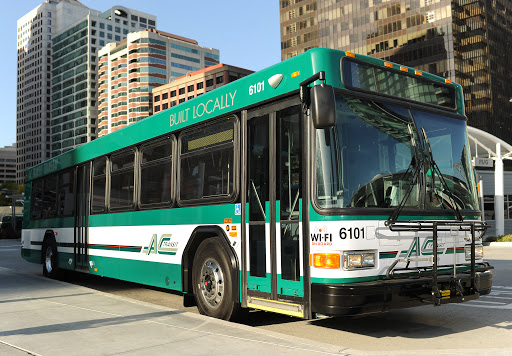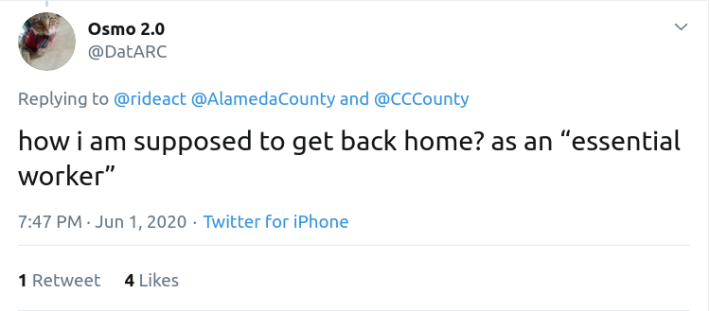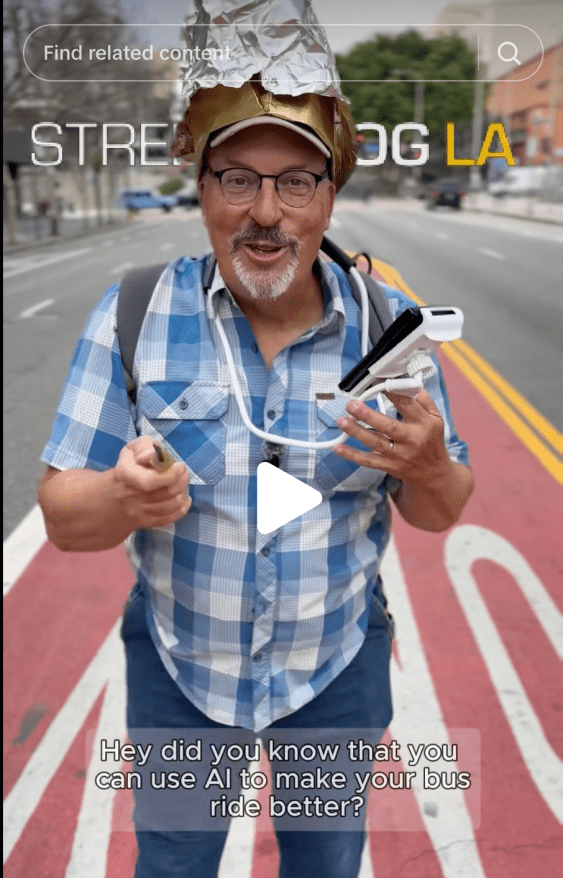Note: GJEL Accident Attorneys regularly sponsors coverage on Streetsblog San Francisco and Streetsblog California. Unless noted in the story, GJEL Accident Attorneys is not consulted for the content or editorial direction of the sponsored content.
In response to the Alameda County curfew order over the George Floyd murder protests, AC Transit is shutting down all night bus services.
From a statement from the transit agency:
To comply with this order, AC Transit will halt all bus service at 7:30 pm, today. This means, intending passengers will not be permitted to board after 7:30 pm and the bus operator will bypass bus stops. Passengers, already on board, are permitted to continue to their final destination. Once the bus is clear of all passengers, the operator will deactivate the head sign and interior lighting, as an external signal that the bus is out of service. We will restore service at 5:00 am.
Meanwhile, BART, thanks to declining revenues and low ridership, started shutting down at 9 p.m. on March 23rd. That means between the COVID service reductions and the curfew, essential workers who work night shifts but don't own a car or can't afford a cab or an Uber are just out of luck.
"Just about the only people riding transit now are people with no other option. To leave them stranded... especially during a time of civil unrest and lack of safety, is unconscionable," said TransForm's Edie Irons .
"Seamless Bay Area and allies have been strongly encouraging the Bay Area's transit agencies to work with MTC to create an integrated service plan during the emergency/recovery, to make sure that people who depend on transit can continue to do so," wrote Friend of Caltrain's Adina Levin, in an email to Streetsblog.
But, it seems, to no avail.
"Our data shows they are very few people riding after 8 p.m. Most trains are empty. Others have one or two," explained BART spokesperson Alicia Trost in response to a request for more information about how people are supposed to get across the Bay after hours.
To be exact, the last available transbay BART train leaves Embarcadero station for the East Bay at 9:19 p.m. The last ferry is at 7 p.m. (Note that Oakland Bay ferries are operated by the Water Emergency Transportation Authority because ferry services are supposed to remain available in an emergency). And, of course, it is still illegal to ride a bicycle on the western span of the Oakland Bay Bridge.
"Even though in most counties the curfew explicitly doesn't apply to essential workers, it is essential workers and those who have few options who will be left behind and with no way of getting around because of these uncoordinated decisions," wrote Seamless Bay Area's Ian Griffiths.
Both Griffiths and Levin also took the Bay Area's transit agencies to task for not clearly communicating the fact that there's now no transbay services at night. "Even now, I'm having trouble figuring out what transit agencies are cutting service, when, because there is no central place where this information is compiled regionally."
The BART web page still tells people "AC Transit currently offers late night transbay bus service" as an alternative.
"This sounds like a total failure of these transit agencies to provide an essential service that people are relying on right now," said Irons.
The Bay Area now joins Los Angeles, Chicago and other cities in stranding the transit dependent by leaving no alternatives after a certain hour. As Streetsblog Chicago put it: "Transit shutdowns, which hurt vulnerable people the most, are not a public safety solution."
Update, June 3: The San Francisco County Transportation Authority invites people to apply to its Essential Worker Ride Home program, "available to all employees of essential businesses in San Francisco, performing essential job functions, as classified by the City. It works by reimbursing commuters for taxi rides during hours when, or to locations where, previously available transit options are unavailable due to temporary emergency-related transit service reductions. The program will cover the cost of up to 10 taxi rides home, per person, per month, and up to $70 per ride."






